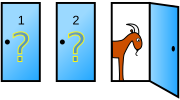The Monty Hall problem, or the Monty Hall paradox is a probability puzzle which originated from a letter to the American Statistician magazine regarding one of the tasks in the American game show 'Let's make a deal' which is still running
Vos Savant's response was that the contestant should switch. If the car is initially equally likely to be behind each door, a player who picks door 1 and does not switch has a 1 in 3 chance of winning the car while a player who picks door 1 and does switch has a 2 in 3 chance, because the host has removed an incorrect option from the unchosen doors, so contestants who switch double their chances of winning the car.Originally Posted by Steve Selvin
Many readers refused to believe that switching is beneficial. After the Monty Hall problem appeared in Parade Magazine, thousands of readers including 1,000 PhDs, wrote to the magazine claiming that Vos Savant was wrong.
Decision scientist Andrew Vazsonyi described how Paul Erdős, one of the most prolific mathematicians in history, remained unconvinced until Vazsonyi showed him a computer simulation confirming the predicted result.
Opinions on this paradox? What does it tell you about the human psyche? Have you heard of this before?




 Reply With Quote
Reply With Quote